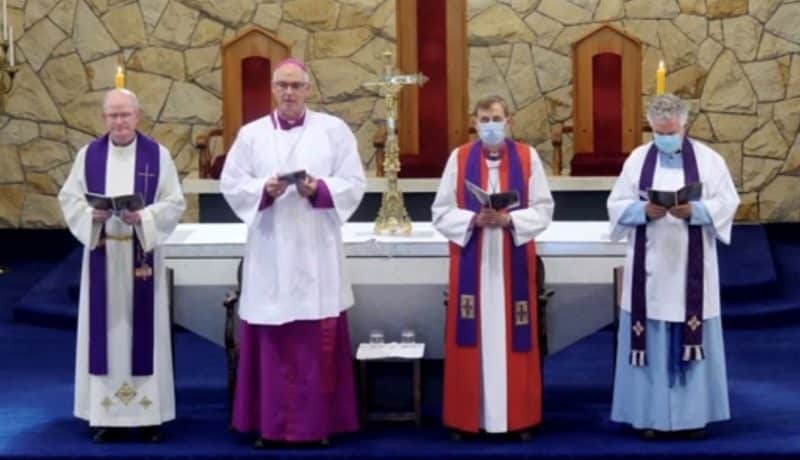“We should not sugar-coat Ash Wednesday,” said the Anglican Bishop of Christchurch, Bishop Peter Carrell, at a joint Catholic-Anglican service at St Mary’s Pro-Cathedral on March 2.
“This beginning of Lent, the start of a focused journey of prayer and fasting through 40 days, ends at the foot of the cross,” Bishop Carrell said. “At the place where God in Christ dies for one reason – to solve the problem of sin.”
At the start of his homily, Bishop Carrell noted that this was the first time as Anglican Bishop of Christchurch that he was preaching at one of these combined Ash Wednesday services. Typically, the Anglican bishop preaches at the Catholic venue in Christchurch and vice versa. Two years ago, the then-Archbishop of York preached at the service.
Bishop Carrell said that talk of sin is not comfortable in today’s world.
“We tend to want to sugar coat sin, and the problem of wrongdoing, to find excuses for our own poor behaviour, or even the poor behaviour of others.”
“One of the ironies of the tragedy in Ukraine is that, for years, people have been making out Putin to be someone who he turns out not to have ever been,” he added.
Sin is a problem and it is not easily dealt with, the bishop said.
“So significant is the problem of our sin for God, that God responded by taking upon God’s own self, through God’s very own Son, the provision of a solution.”
“As we struggle with sin in our lives . . . let’s keep focused on Christ and the cross. God wants us to be righteous, and God has paid all costs for that to happen. God’s will is that we grow into the very likeness of Christ, and our challenge in this life is to cooperate with God’s will, with God’s plan for our lives.”
Bishop Carrell cited Scriptural references that encourage people to persevere in the struggle to try to be righteous and not to fall into sin.
“What in 2022, might some aspects of living for Christ and struggling with sin mean?”
He suggested the following: “It is vital that we live as transparently as possible. That we harbour no secrets about our personal and collective behaviour. That we are accountable to others for our deeds and misdeeds. That may be with a small group or a supervisor, or through a spiritual director. Or simply with a friend with whom we will be honest. Finally, that we confess our sins to one another and are willing to address sin in each other.”
He had also referenced a passage in the Book of Common Prayer that confessed sin as a community – “We have offended . . . “ – and which stated “there is no health in us”.
He said the struggle against sin was not just about striving to be holy as an individual, but pertained to the collective life as God’s people too.

Reader Interactions